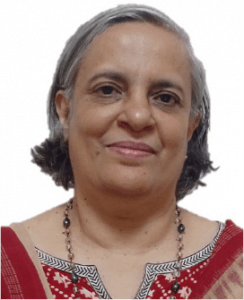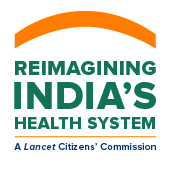In Conversation: Thelma Narayan, Director, Academics & Policy Action, SOCHARA
March 16, 2022

I graduated in medicine from a leading community health oriented medical college in Bangalore. Key experiences right from my first year included community and family visits in poor neighbourhood localities; working with construction workers of the college hospital being built; participating in running free clinics and development initiatives as part of an ‘action group’ covering a 5 km radius of the college; responding to a fire which burnt down a nearby colony and to a hooch tragedy; and finally during internship joining the 1977 Andhra Pradesh cyclone relief team. This resulted in my decision to take up community health as a life option. There has been a huge learning curve and no looking back since then.
Five years of teaching in the same college were equally hectic with the Dept initiating a residential community health workers training program in 1978; working in primary health centres, upgrading health subcentres, running rural camps for medical students, working with a health cooperative as part of a milk cooperative etc. This was the heady period of the Alma Ata Declaration, and Health for ALL became a personal and collective goal and a vision to be actualised. I began to understand the health system by working in it.
Joining the medico friend circle and its response to the Bhopal disaster led me to a Masters in Epidemiology and to a deepened interest in the underlying determinants of health, and later to doctoral work in Health Policy Analysis both at LSHTM. Opportunities to work with the Karnataka TaskForce on Health and Family Welfare with 9 studies undertaken to inform our recommendations; and later work with the National Rural Health Mission made it clear that change in the health system was not only possible, but happening at scale. The communitisation of the public health system was a landmark.
Being part of the Measurement and Evidence Knowledge Network of the WHO Commission on Social Determinants of Health and the follow up political declaration in 2011 was important methodologically, and I hope these reports get greater attention as they point to the need to understand and address the causes of inequity in health and access to health care.
I see my role as contributing to the discussions and processes of the various streams of the Commission’s work based on my own interest and experience in community health and public health, together with my commitment to Health for All. I am working on the human resources for health work stream more specifically. We use a comprehensive primary healthcare framework to guide us. I would hope that the social determinants of health get addressed by the Commission.
Public financing for health as a proportion to the GDP has been extremely low since decades. This is one of the foremost challenges in achieving UHC in India. Equitable access to universal health care cannot be reached without enhancement of public funding. India cannot afford not to allocate more tax funding for health.
Education of health professionals with a focus on quality, competence and integrity is essential to the functioning of the health system. While health science education has grown, this has been uneven in terms of quality and distribution. The focus has been on education for curative care. Essential cadres who are adequately trained for health promotion, rehabilitation and palliative care are missing. Increasing privatisation of medical and nursing education, with students forced to take big loans, results in shortages in areas where they are most needed. Policies for health science education need to be streamlined and revamped to be able to meet health needs in the community and to achieve UHC.
The work of the Commission is part of a broader process to strengthen and realise UHC. Based on the wide ranging consultative and participatory research approach being utilised by the Commission, I am hopeful that wider and deeper social interest would be generated on the crucial importance of realizing Universal Health Care within a time frame of ten years. Creative communication methods by the Commission are already drawing attention and participation towards UHC.
More specifically, if a group of researchers is formed who can mainstream qualitative and quantitative methodology to measure progress towards UHC, from the point of view of the affected, the Commission would have made a substantial contribution. Systematic work on understanding and measuring equity in health outcomes, and of the steps used to redress this, at state and local levels would enable realization of SDG and UHC goals.
Evidence based development and management of human resources for health with HRH units at state and district levels, and a public health cadre is a necessity for India’s health system to meet its mission, including for pandemic preparedness.
Citizen voice will hopefully gain greater centrality in health processes. including decision making, as we go forward, through institutional mechanisms, some of which are already in place. Governance and accountability mechanisms, initiated through the NRHM-NHM would hopefully become more robust.
